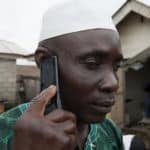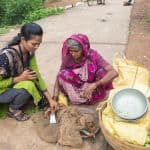Digital Inclusion by Way of Backpack: A Q&A with Imcon International CEO Rob Loud
The International Telecommunication Union (ITU) estimated that by last year’s end, 51.2 percent of the global population would be connected to the internet. While this represents a vast improvement from the 36.9 percent reported in 2013, it of course leaves out nearly half the world’s population. And of the billions still lacking internet access, 90 percent are in the developing world. “Bridging this digital divide is crucial to ensuring equal access to information and knowledge, as well as fostering innovation and entrepreneurship,” says the UNDP.
If we are to achieve Sustainable Development Goal 9’s aim of delivering universal, affordable internet access to the world’s least developed countries by 2030, we need new innovations and new tactics to bring the digitally excluded into an increasingly online world.
Enter the Internet Backpack. After years of working as a consultant to large-scale wireless projects, J. Rob Loud came across technology originally conceived by a Syracuse University professor that could provide ICT solutions in areas lacking digital infrastructure. Loud acquired IP pertaining to the solutions from a private company and in 2017 founded Imcon International, an Atlanta-based startup that provides immediate internet connectivity via a self-powered mobile platform, with a particular focus on “stressed environments or remote locations.”
Last fall, Imcon teamed up with SU’s School of Information Studies and the government of Liberia for a new campaign called “40 in 2021”, which aims to utilize Imcon’s “Internet Backpack” to increase connectivity from 7 to 40 percent in 2021. “The Liberia project is the first of many projects we envision rolling out on a global scale over the coming months and years,” Loud said in a statement on the project.
And roll forward it has. The company, along with partner The Democracy Lab, is now taking its Internet Backpack to another corner of the globe: Costa Rica. At first, this may seem like an unusual choice: The country’s level of internet penetration dwarfs that of Liberia at 71.6 percent versus Liberia’s 7.3 percent, according to World Bank development indicators — not far from the United States’ 76.2 percent. But as Loud explains, Costa Rica’s far-flung rural areas are facing connectivity challenges similar to those in West Africa.
We caught up with Loud to discuss the challenges of bringing internet access to last-mile consumers, the Internet Backpack’s potential to address those challenges, and his vision for impact in Costa Rica.
Katie Beasley: What are the primary challenges of getting internet access to remote locations like rural Costa Rica? What additional barriers exist in connecting rural customers in emerging markets that may not exist in rural Canada or the U.S.?
Rob Loud: Remote locations often do not have power or existing communications infrastructures. Also, in many remote areas, customers often have little to no experience with the Internet. Here in the U.S., we take things like cell phones, internet access and power for granted. In remote locations, these tend to be luxuries. Therefore, in addition to (the challenge of) bringing the Internet Backpacks, there is a learning curve for the customers with regards to Internet usage.
KB: Describe the Internet Backpack: Why is this approach likely to deliver digital access where others have failed?
JRL: The Internet Backpack (IB) is meant to be a fire starter. We understand the IB is not the permanent solution for communications and internet infrastructure; however, we believe by getting users online in remote areas, it will encourage the incumbents to build out their networks faster.
Also, the Internet Backpack is completely mobile and self-sustaining. The IB can connect users on roughly 90 percent of the planet, even in the most remote areas. We designed it to be self-powered so it could go anywhere, anytime and not have to depend solely on existing infrastructures or test infrastructures. I don’t want to take away from those, but the IB fills a unique space in the market.
KB: Why is Costa Rica an ideal hub for starting up Imcon’s digital inclusion efforts in the Latin American region?
JRL: Geographically speaking, Costa Rica is in a great spot to centralize operations. In addition, San Jose is a technologically rich city. There is a great wealth of technical talent there that enables us to create jobs and invest in those areas.
KB: In addition to the new program in Costa Rica, Imcon and Democracy Lab are also collaborating in West Africa. Could you describe that initiative, and how its aims and strategies overlap and/or differ from those of the Latin America project, if at all?
JRL: The Costa Rica and West Africa projects are similar, yet different. The goals are the same, which is to bring internet and communications access to underserved populations throughout the world. The projects differ in structure as each requires different objectives and partners while achieving the same goals.
KB: How does the public-private nature of the new venture in Costa Rica uniquely position Imcon/Democracy Lab to reach the digitally excluded?
JRL: The public-private partnerships allow Imcon and the Democracy Lab to help bridge the digital divide by bringing communications and internet access to the digitally excluded and empower those users to everything from better education, information access and even entrepreneurial activities. The goal is not to simply bring access, but to work with the partners in other business sectors to empower the new users.
KB: The Costa Rica program is set to target up to 800 indigenous and rural schools. What are the benefits of promoting digital inclusion at this level rather than, say, through targeting family homes? Are there plans to expand beyond schools?
JRL: The plan is to bring internet access and communications access to as many people as we possibly can. Schools typically have larger numbers than family homes, and this allows us to get more users online in a shorter time frame. The goal of the internet access is to be a tool to improve educational opportunities in the schools. We have discussed options of making the access open to the public after school hours, but those plans have not been finalized as of yet.
KB: In your view, what are the intended economic implications of increasing civic engagement (one of the Democracy Lab’s goals) – specifically among those in the last mile? How does the partnership with the Democracy Lab strengthen Imcon’s mission?
JRL: The Democracy Lab’s mission of helping all people have access to information was the seed that brought about the partnership. Users in the last mile will have new opportunities for economic growth through the access to different sales and distribution channels. Examples could range from a user setting up a Shopify account and starting to sell goods online, to farmers using IoT devices and communicating through the Internet Backpack to improve their crop yields. We recognize this won’t happen on day one, but these are just examples of things that could occur and have economic implications once these users are online and tapping the power of the internet.
KB: How does the new Internet Backpack program in Costa Rica intend to generate profit? Do all of Imcon’s programs intend to be financially self-sustaining in the long term?
JRL: Imcon International Inc. is a for-profit company. Our goal is to “Do Well by Doing Good.” Often times, the perception is that a corporation cannot do good in the world and make a profit; and doing well as a company typically means that a company cannot do good at the same time. We believe the two are not mutually exclusive, and hope to show that companies can do well and at the same time do good.
KB: Imcon recently announced a partnership with Highmark Global Tech, Inc. to expand into new territories worldwide. Tell us more about this partnership, how it will help disseminate the Internet Backpack, and how it fits into your global strategy for the coming years.
JRL: Highmark Global Tech, Inc. is a great partner and we are excited to be working with them. They bring unique relationships and opportunities throughout the world. Over the next year, we expect to enter into three to five new markets including India and Canada through the partnership with Highmark Global Tech.
Katie Beasley is a communications specialist at NextBillion.
Photo courtesy of Imcon International.
- Categories
- Education, Social Enterprise, Technology



